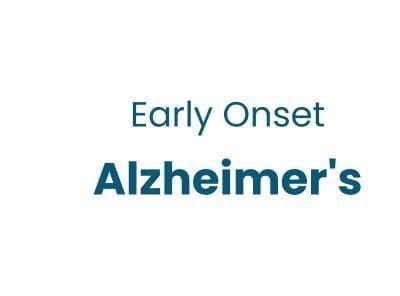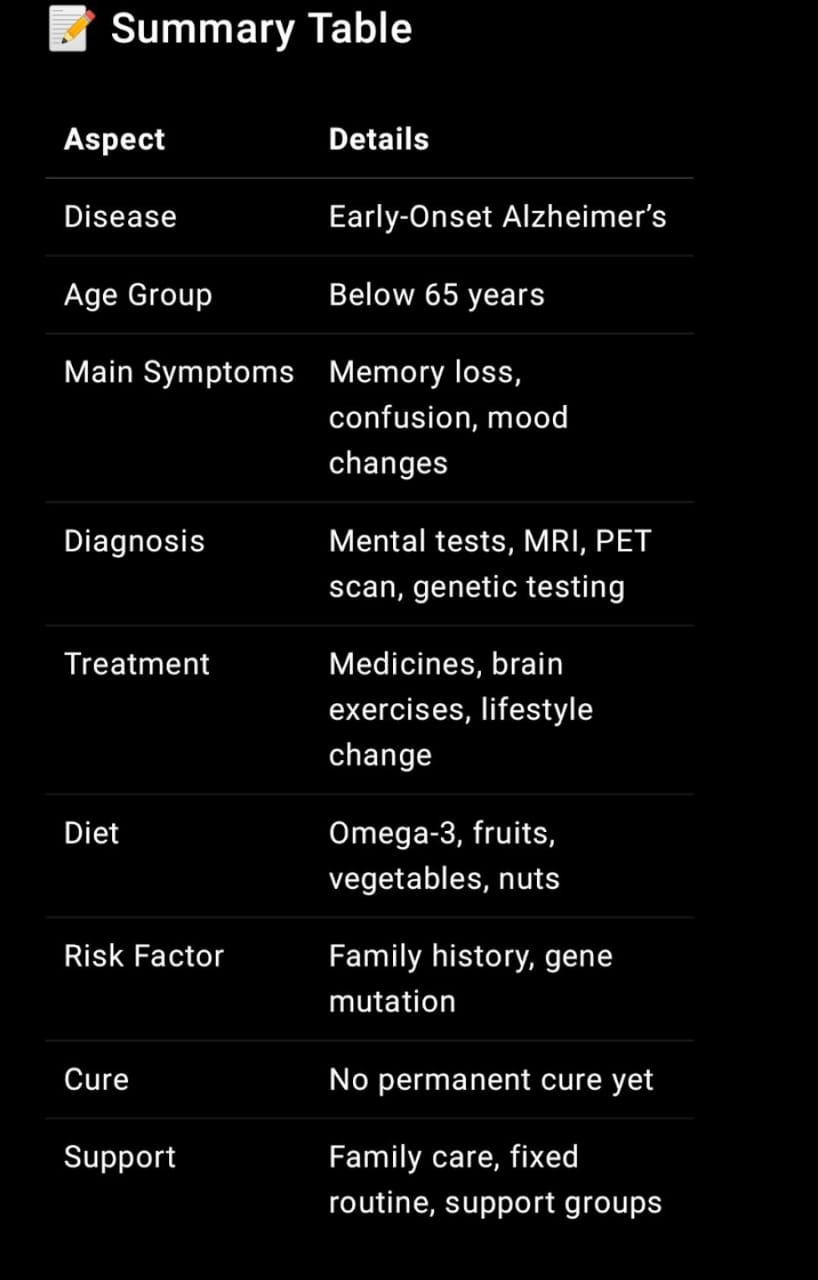Tv10punjab | Health Desk
🌱 Introduction: What Is Early-Onset Alzheimer’s?
Alzheimer’s disease is a condition that slowly damages the brain and affects memory, thinking, and behavior. It usually happens after the age of 65. But in some rare cases, it begins much earlier — even in the 30s, 40s, or 50s. This is called Early-Onset Alzheimer’s Disease.

Though uncommon, early-onset Alzheimer’s can be very challenging for the person and their family. Let’s understand its causes, signs, diagnosis, treatment, and how a healthy diet can help.
🧬 What Causes Early-Onset Alzheimer’s?
Most cases of Alzheimer’s happen due to aging. But early-onset is often linked to genetic changes.
🔹 1. Genetic Mutations
Some people are born with changes in certain genes (like APP, PSEN1, or PSEN2). These can increase the risk of developing Alzheimer’s early in life.
🔹 2. Family History
If a parent or grandparent had Alzheimer’s at a young age, the risk is higher.
🔹 3. Unknown Factors
In many cases, the exact cause is not clear. It may involve a mix of genetics, environment, and lifestyle.
📉 Who Gets Early-Onset Alzheimer’s?
It affects people usually between 30 and 60 years.
About 5% of all Alzheimer’s cases are early-onset.
It affects both men and women equally.
People with Down syndrome have a higher risk.
⚠️ Common Warning Signs
The signs of early-onset Alzheimer’s can be subtle at first but become worse over time. Common symptoms include:
🧠 1. Memory Loss
Forgetting recently learned information
Repeating the same questions
Losing track of dates or names
🔄 2. Confusion
Getting lost in familiar places
Trouble understanding directions
Difficulty following a conversation
🧩 3. Trouble Solving Problems
Making errors in bills or work
Difficulty planning or organizing
💬 4. Speaking Problems
Struggling to find the right words
Pausing often during speech
😞 5. Mood and Behavior Changes
Increased anxiety, depression
Aggression or irritability
Withdrawal from family and friends
🚶 6. Difficulty with Daily Tasks
Trouble dressing, cooking, or driving
Misplacing items and forgetting where they were kept
📋 How Is It Diagnosed?
Early-onset Alzheimer’s is difficult to diagnose, especially in young people, because symptoms are often mistaken for stress or depression. A full check-up is needed:
👨⚕️ 1. Medical History
Doctor will ask about symptoms, family history, and lifestyle.
🧠 2. Mental Tests
Simple memory and thinking tests to check attention, language, and reasoning.
🖥️ 3. Brain Imaging
MRI or CT scan – checks for brain shrinkage
PET scan – detects abnormal proteins (amyloid and tau)
🧪 4. Genetic Testing
If there is a family history, doctors may recommend a genetic test for Alzheimer-related genes.
💊 Can It Be Treated?
There is no cure for Alzheimer’s yet, but treatments can help manage symptoms and slow down its progress.
💊 1. Medications
Donepezil – helps with memory
Memantine – improves brain communication
Antidepressants – for mood changes
💬 2. Cognitive Therapy
Activities like puzzles, memory games, reading, and writing help keep the brain active.
🧘 3. Lifestyle Changes
Exercise, sleep, and stress management can help improve quality of life.
👪 4. Family Support
Caregiver support and understanding are essential. Many families join support groups to share experiences and solutions.
💡 Living with Early-Onset Alzheimer’s
Living with early-onset Alzheimer’s is emotionally difficult. People often feel:
Embarrassed about forgetting things
Depressed due to the loss of independence
Frustrated by their changing behavior
That’s why emotional support and mental health care are just as important as medical treatment.
🏠 Support for Family Members
Families also go through many changes. Here’s how loved ones can help:
Be patient and calm
Help with reminders and daily tasks
Create a fixed routine
Keep the home safe (lock medicines, use labels)
Avoid arguments – stay gentle and understanding
Plan for future medical and financial decisions early
🧘 Lifestyle Tips for Brain Health
While you can’t always prevent Alzheimer’s, some lifestyle habits may reduce risk or slow it down:
🏃♂️ Physical Exercise
Walk, stretch, dance, or swim for 30 minutes daily.
🧠 Brain Exercise
Play chess, read books, do crossword puzzles, or learn a new skill.
🛌 Proper Sleep
7 to 8 hours of sleep every night is important for brain repair.
👬 Stay Social
Spend time with friends and family. Talk, laugh, and share.
😌 Manage Stress
Try yoga, meditation, or breathing exercises to keep stress low.
🍲 Simple Diet Plan for Early-Onset Alzheimer’s
A healthy diet supports brain function. Below is a sample diet plan that is rich in omega-3, antioxidants, and brain-friendly nutrients.
🥗 Morning (Empty Stomach)
1 glass warm water with 1 tsp chia seeds or lemon
5 soaked almonds and 1 walnut
🍽️ Breakfast
Vegetable oats or poha
1 boiled egg (if non-veg)
1 cup green tea or fresh fruit juice (without sugar)
🥤 Mid-Morning Snack
1 apple or banana
A handful of sunflower seeds or pumpkin seeds
🍛 Lunch
2 multigrain chapatis or 1 bowl brown rice
Cooked green vegetables (spinach, broccoli, peas)
Dal or chickpeas
Fresh salad and curd
☕ Evening Snack
Herbal tea with 2 digestive biscuits
Roasted chana or puffed rice with nuts
🍲 Dinner (Light)
1 bowl vegetable soup
1–2 chapatis or 1 small bowl khichdi
Cooked carrots, beans, and bottle gourd
🌙 Before Bed
1 glass warm turmeric milk (haldi doodh)
A few raisins or a small piece of dark chocolate (optional)
🚫 Foods to Avoid
To support brain health, avoid or limit the following:
Fried and processed foods
Sugary snacks and sodas
Excess salt
Alcohol and smoking
Red meat (limit intake)
🧪 Research and Hope for the Future
Scientists are constantly studying Alzheimer’s. New therapies and medications are in development, especially targeting the amyloid and tau proteins that damage the brain.
Early detection and healthy living are the best tools we have until a complete cure is found.
📝 Summary Table

💬 Final Words
Early-Onset Alzheimer’s is rare but life-changing. It not only affects the brain, but the heart of families as well. While we wait for a cure, early detection, lifestyle management, emotional support, and brain-friendly food can make a big difference.
If you or a loved one is experiencing symptoms, don’t wait — talk to a doctor and seek help. Early steps can protect your future.